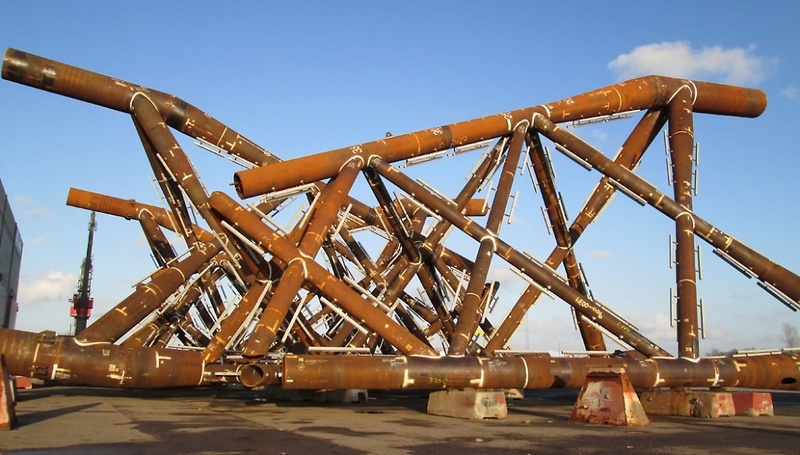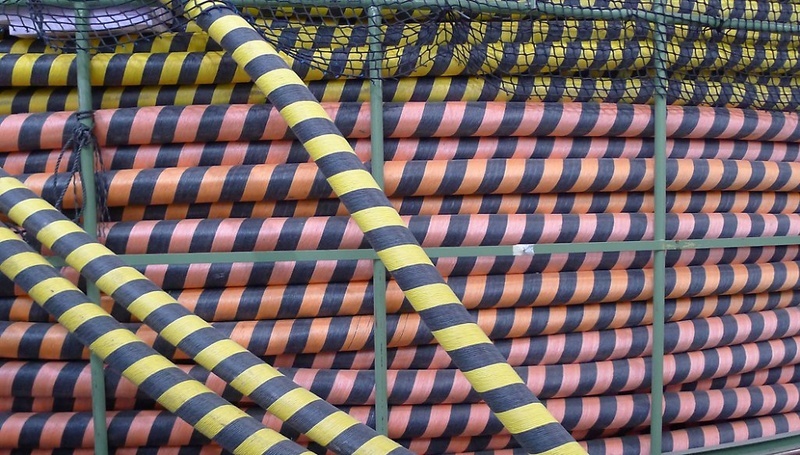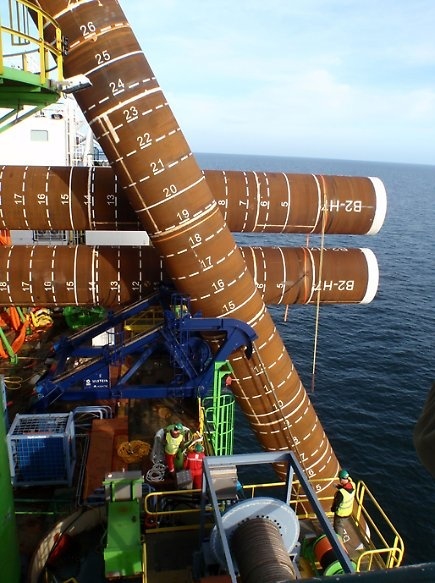News Release from Windmesse.de
Wind Industry Profile of
Introducing Offshore Wind Farm EnBW Baltic 2
Although Germany has the advantage of having two oceans in front of its shores, the main construction area lies in the North Sea so far. Difficult sea ground, highly frequented shipping routes and high environmental protection requirements make the construction of wind farms in the Baltic Sea difficult. Nevertheless Germany already has a wind farm up and running there: EnBW Baltic 1 has been producing electricity since 2011 and thus providing green energy for more than 50,000 households.
Having built Baltic 1 German energy supplier EnBW could gather precious experience for the construction of its second wind farm in the Baltic Sea called EnBW Baltic 2. The farm is located 32 kilometers north of the island of Ruegen in the trijunction of Germany, Denmark and Sweden. The region consists of shallow waters with a depth of 23 to 44 meters. Construction area: 27 km².
“We use our valuable experience from the construction of our first wind farm EnBW Baltic 1 to construct EnBW Baltic 2 with all our strength”, states Jens Kühnel, manager for maritime logistics at EnBW. Baltic 2 will have four times the size and produce six times the electricity of Baltic 1.
First plans for constructing this offshore wind farm occurred in 2001 and were initiated by the Offshore Ostsee Wind AG. The wind farm's name was to be 'Kriegers Flak' at the beginning. It was renamed to EnBW Baltic 2 after EnBW took over as owner in 2008. The final construction permit was issued in 2005 by the German Federal Maritime and Hydrographic Agency (BSH).
Contracts were handed out in 2010: Siemens was named as turbine supplier. EnBW Baltic 2 will consist of 80 SWT 3,6-120 turbines which will rise 139m above the water. Rotor diameter is 120m. Construction should have started in 2012 already, but due to problems with difficult sea ground it had to be postponed to 2013.
Because of the different depths of water in the area the turbines will be constructed on different types of sockets: Monopiles which can only be used to a water depth of 35m, will be used for 39 turbines. 41 turbines will be constructed on top of jackets. EnBW Baltic 2 will have a capacity of 288MW and thus provide clean energy for 340,000 households. This adds up to a yearly CO2 reduction of 900.000 tons.
Construction work in progress
Early in 2013 the installation of sea cables started. EnBW Baltic 2 will use logistics already in place. Electricity will run through the substation constructed by Alstom and Weserwind for EnBW Baltic 1. In the city of Bentwisch where the cables reach the shore it will be re-transformed and fed into the German grid by 50 Hertz Transmission, a German grid provider.
Construction of the foundations started last year in August. “With the installation of the foundations we started the crucial construction period. Our second offshore wind farm is thus about to take shape. We – and especially our offshore team – did work very hard to reach this goal”, said EnBW CEO Dr. Hans-Josef Zimmer.

Meanwhile all foundations have been installed. Next step will be the erection of the turbines. Components have been reaching the harbor of Sassnitz-Mukran on the island of Ruegen since the beginning of June. All construction work is monitored here. Turbine parts, nacelles, blades, switchboards etc. are stored in the harbor until they are needed. Final turbine construction will take place in the summer months to come.
Installation of the cables is underway and running. More than half of the cables are already in place so the farm will be connected to the grid still this year.
The Offshore Interconnector Project
Originally, EnBW Baltic 2 was part of a huge international project: Denmark had planned the construction of a 600MW offshore wind farm likewise called 'Krieger's Flak' in the trijunction area, too. It was supposed to be supplied with a special connection to the German wind farm making it more easy to exchange electricity between the two countries. Even Sweden should have been able to connect itself to this 'supergrid' providing clean energy for many households in Europe.
The EU supported the project with 150 million EUR. “This project raises huge international attention, because it can function as a role model for further grids in the Baltic Sea, the North Sea or the Mediterranean Sea”, said Peter Jorgensen from Danish energy utility Energienet.dk at the time. German company 50 Hertz Transmission was part of this project already and is now providing grid connection for EnBW Baltic 2.
But the project was smashed one month ago. Denmark announced the postponement of 'Krieger's Flak' for two years. Plan was to construct and connect the Danish wind farm in the years of 2018 to 2020. Due to the new plan construction won't start before 2020. Furthermore the wind farm will be conneced to the grid with a conventional AC system, not with the DC system required for the Super Grid. The project proved to be economically unprofitable at the moment.
A representative of the Danish utility, Energienet.dk, underlined though that the company is still working on a solution. “At the same time, we continue our operation with our German partner, 50 Hertz Transmission, to develop a new technical solution for an electrical connection between Denmark and Germany which can be connected to the AC grid”, said Dorthe Vinther, Vice President at Energienet.dk.
So if technology continues to develop, the supergrid will indeed one day connect the two countries. But now is not the time.

Copyright of the Pictures: EnBW - Construction Diary of EnBW Baltic 2
- Author:
- Katrin Radtke
- Email:
- press@windfair.net


